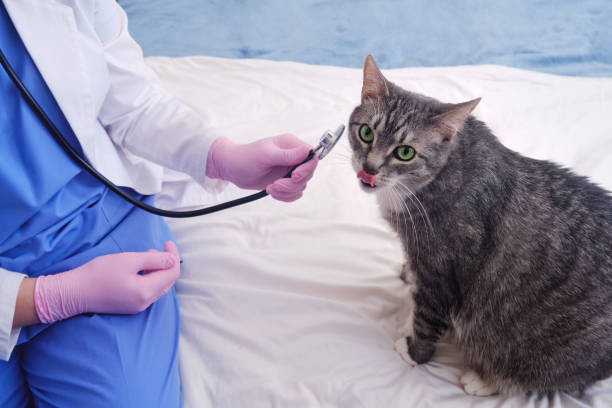views
 Coughing in cats can be confusing. It might seem like a minor throat tickle, but it could point to a deeper health concern. Many pet owners wait, thinking it's just a hairball or dust. Yet, delays in response can turn small issues into complex problems. Timely and correct treatment for cat coughing in Ontario often makes all the difference. This blog helps you know what to look for and when professional care becomes necessary.
Coughing in cats can be confusing. It might seem like a minor throat tickle, but it could point to a deeper health concern. Many pet owners wait, thinking it's just a hairball or dust. Yet, delays in response can turn small issues into complex problems. Timely and correct treatment for cat coughing in Ontario often makes all the difference. This blog helps you know what to look for and when professional care becomes necessary.
Coughing Isn’t Always About the Lungs
Cats cough for different reasons. It’s not always respiratory. Post-nasal drip, irritants, or even dental issues can trigger a reflex that sounds like a chest problem. That’s why relying on symptoms alone can be misleading.
Observing the pattern is key. A dry cough may hint at asthma. A wet one could suggest fluid buildup. Reverse sneezing often gets mistaken for coughing, adding to the confusion. A quick video clip of your cat during an episode can help your vet make a better assessment.
Don’t Wait for Symptoms to Worsen
Occasional coughing might not seem urgent, but repetition should raise concern. If the sound lasts more than two days or increases in frequency, it's time to consult a vet.
Lethargy, appetite loss, or breathing changes are warning signs. These could signal infections, parasites, or chronic issues like bronchitis. Avoid self-diagnosing. It only masks signs and delays real help.
Early diagnosis helps avoid long-term problems and reduces the need for stronger medications later.
Hairball or Something Else?
Cats groom constantly, which leads to swallowing hair. Most pass it easily, but some build up over time. While gagging and coughing are typical for hairballs, they shouldn’t happen every day.
Chronic attempts without results point to digestive or airway concerns. If coughing doesn’t lead to hair expulsion, it’s no longer just about grooming.
Stomach or lung conditions may present similarly, so ruling them out requires professional testing.
Chest Sounds Aren’t Just Noise
Strange breathing sounds need attention. Wheezing, gurgling, or labored breathing often show up during coughing spells. These noises indicate airway narrowing, fluid accumulation, or internal swelling.
In such cases, X-rays, blood work, or ultrasound may be needed to find the cause. Don’t wait for your cat to show distress—by then, the problem could be critical.
Timely action leads to faster recovery and fewer complications.
Medications Aren’t One-Size-Fits-All
Treatment varies based on the root issue. Steroids might help inflammation but worsen infections. Antibiotics can help bacterial causes but do nothing for asthma. Giving cough suppressants without diagnosis is risky.
That’s why identifying the cause matters more than stopping the sound. A tailored plan ensures fewer relapses and avoids harming your cat with incorrect solutions.
Veterinary supervision keeps dosing safe, especially for older or sensitive pets.
Chronic Coughing Might Be Hiding a Larger Issue
Long-term coughing isn’t just annoying. It may be linked to heart disease, allergies, or even tumors. These cases require more than just surface-level treatment.
Blood pressure checks, fluid scans, or even cardiology referrals could be part of the process. Ignoring the signs because your cat "looks fine" only adds stress for both pet and owner.
A proper exam ensures nothing goes unnoticed.
Lifestyle Factors Play a Bigger Role Than You Think
Dusty litter, poor air flow, or smoke exposure can all affect breathing. If your cat lives in a home with scented sprays or candles, it may trigger a reaction.
Food allergies can also cause post-nasal discharge, making the cough worse. Adjusting your home setup, even slightly, can reduce flare-ups between treatments.
Routine vet visits allow you to stay ahead of triggers and adjust care accordingly.
Coughing Is a Clue — Don’t Ignore It
Acting early helps prevent serious illness. Waiting for symptoms to worsen often results in longer treatments, higher costs, and more stress for your pet.
Make coughing part of your regular health checklist. It's not just about comfort — it's about catching the signs your cat can’t explain.
In Ending:
Ongoing support, such as dental checks, indoor air quality control, and updated vaccinations, all reduce cough triggers. But monitoring weight and activity levels matters too. Excess body fat puts pressure on airways and complicates breathing. That’s why addressing body condition through proper diet and obesity in animals treatment in Ontario is essential in long-term respiratory care. Regular evaluations can prevent many issues from reaching a crisis point. If your cat has coughed more than once this week — don’t guess. Get answers. Speak to your vet, describe the pattern, and ask about next steps. A few simple tests today could prevent complex treatments tomorrow.
Book a vet appointment now — your cat’s lungs shouldn’t be left to chance.



Comments
0 comment